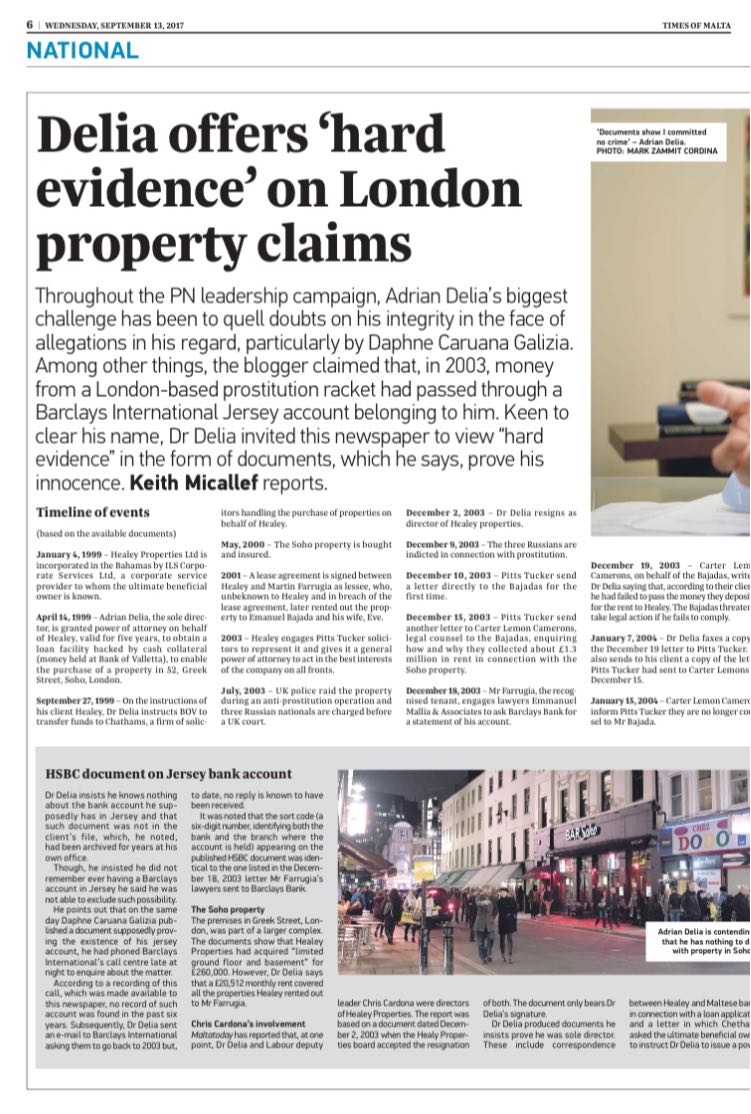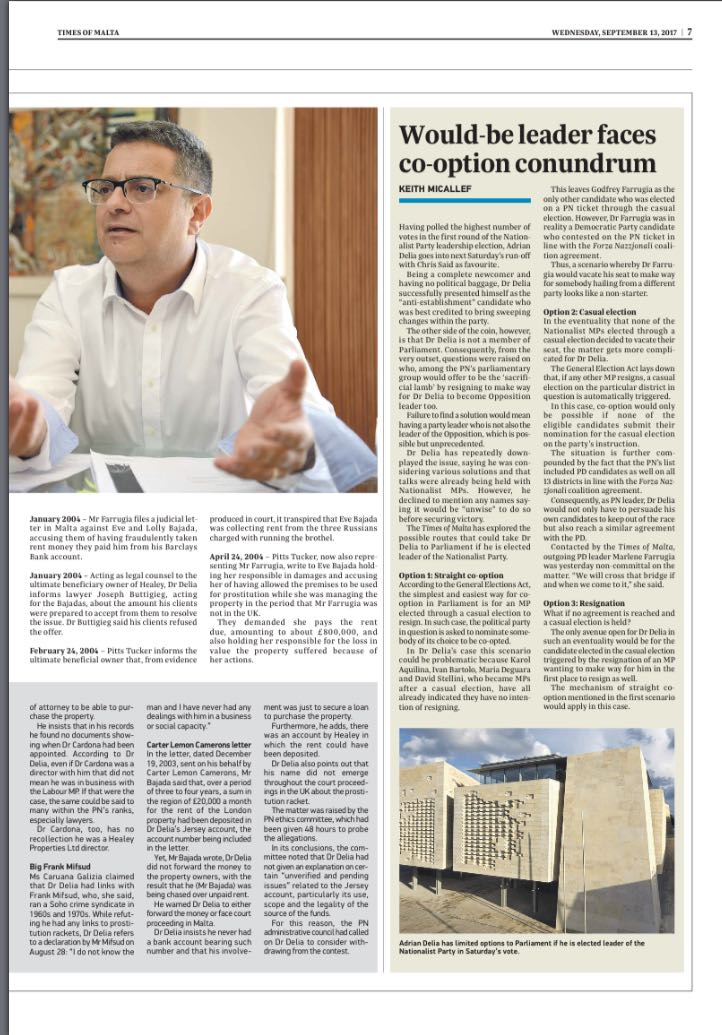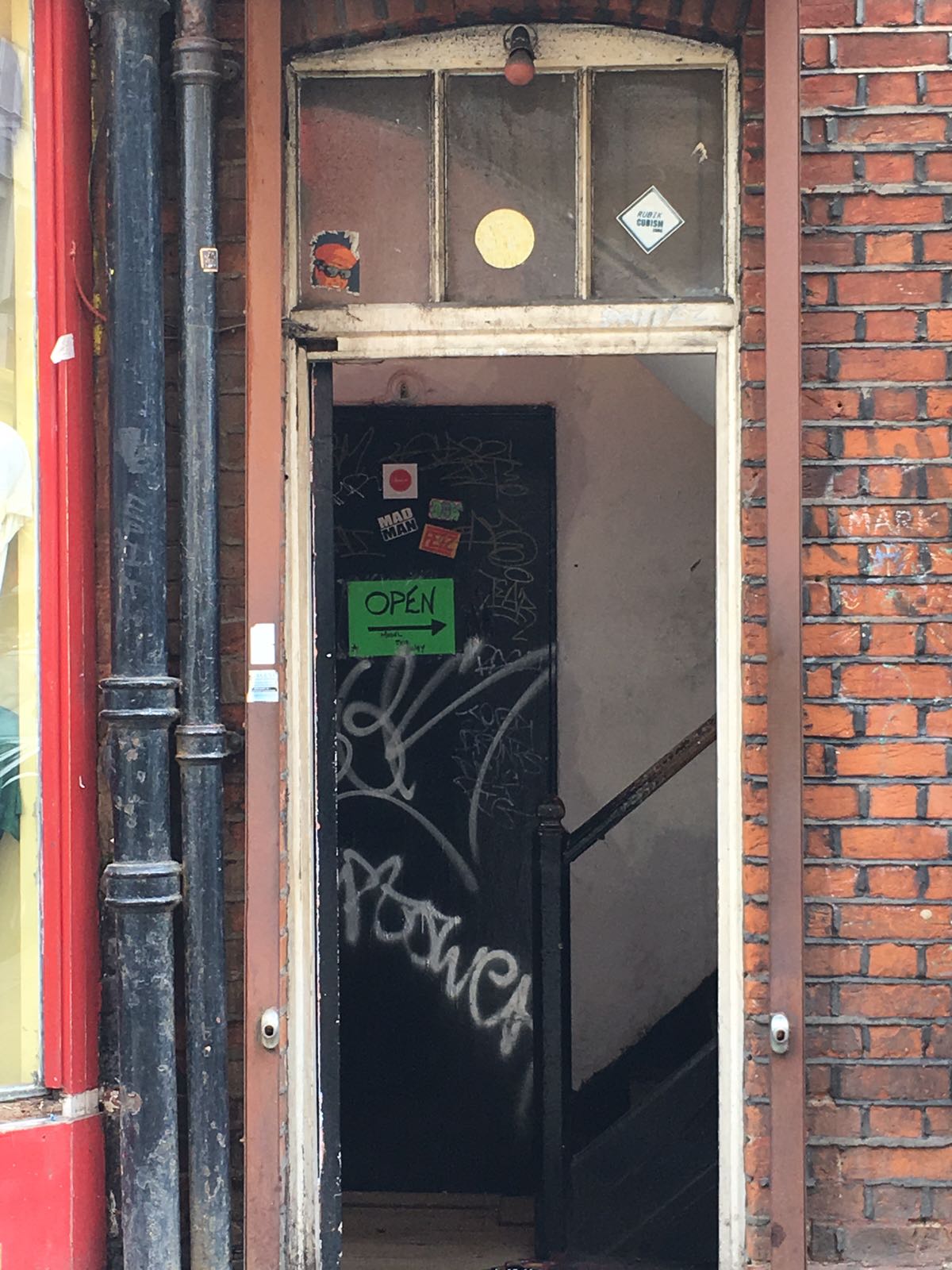This is what Adrian Delia didn’t tell the Times of Malta
The print edition of the Times of Malta carries a double-page spread today featuring Adrian Delia’s ‘hard evidence’ – the newspaper chose, wisely, to put that in inverted commas – by which is meant documents which Delia himself has selected from his archived files to show to a journalist. The article does not appear to be on line yet.
These are my observations. You have to start out by taking for granted that Delia will have removed all documents from the file which he did not wish the journalist to look at. You then have to factor in that he refused to tell the journalist who actually owns the brothel on Greek Street, having concealed the owner behind a nominee company of which he was the sole director with a power of attorney.
Nor does he tell the journalist that the Greek Street brothel was, at the time, part of a portfolio of other brothels which included flats at Market Mews (Shepherd Market, Mayfair) and Stanhope Row, which have since been sold to third parties for development.
The identity of the ultimate beneficial owner of the property is the most important part of the information. The journalist who worked on the story should have focussed on that, because all else follows from it and the rest of the information is both meaningless and fraudulent without it.
Given that this website published the identity of the owner – Eucharist Bajada – it follows that the journalist from the Times of Malta had it and so at the very least should have confronted Delia with it up front: “Do you, or do you not, confirm that the ultimate beneficial owner of the Greek Street property is Eucharist Bajada?” The fact that the journalist did not is a dereliction of duty, intentional or otherwise, and renders the rest of his report meaningless, because the most crucial information is missing.
I also published information on the identity of Martin Farrugia, who held the lease, and how he was used as a front by Eucharist Bajada. Again, the journalist at the Times should have challenged Delia with this information if he did not wish to accept it at face value from me. Ignoring it is another dereliction of duty which continues to undermine his report.
Basically, this is what Delia wanted the Times of Malta to report, and the newspaper obliged.
A person whose identity Adrian Delia cannot reveal because he is his client bought 52 Greek Street using a nominee company of which Delia himself was the sole director with a power of attorney for the UBO. The property was then leased to a certain Martin Farrugia who in turn allowed Eve and Emanuel Bajada to use it for prostitution without his client’s knowledge or consent.
Adrian Delia can’t remember anything about the bank account in Jersey and even though he received letters from lawyers containing the bank account number in his name and requests for the £1.4 million deposited in it over around four years, and presumably dealt with those requests he still doesn’t know anything about this bank account or whether it existed and consequently he does not know what happened to £1.4 million deposited in an offshore account in his name which he can’t remember having.
The minute you do what Delia doesn’t want you to do, and insert his client’s name into the equation – Eucharist Bajada – and the facts that Martin Farrugia was his front, that 52 Greek Street was used for prostitution when he bought it and is still being used for prostitution today when he continues to own it, the Times of Malta report falls to bits.
This is what you need to know.
1. . 52 Greek Street, and its adjacent property at No. 1 Bateman Street (together they form a street corner in Soho), were used for prostitution already when Eucharist Bajada bought them in 1999 through a nominee company and with Adrian Delia as sole director holding a power of attorney.
2. The two addresses were not purchased in isolation but as part of a portfolio of properties that were all used for prostitution, the others being flats at Market Mews and Stanhope Row. That is why Adrian Delia did not give the Times of Malta the price that was paid when he described how his client bought 52 Greek Street with a loan against cash from the Bank of Valletta: because 52 Greek Street was bought as part of a package and the entire package cost around £4 million. But the journalist from the Times of Malta should have demanded to know the price paid.
3. The journalist did not ask Adrian Delia who Martin Farrugia was, but he should have. I gave that information on this website too, and the least that the journalist would have been expected to do is challenge Delia about it. Martin Farrugia was a Maltese man on the brink of bankruptcy in London, involved in that network, and who was dying of testicular cancer. He had a wife and young children, and agreed to sign anything for Eucharist Bajada and his lawyers as long as Bajada took care of his wife and children after he died. He was used as a front for the prostitution racket by holding the leases to the property in his name. He ended up sleeping in his car in Malta while battling terminal cancer. Delia’s client did not look after his wife and children as he was promised. They ended up living off social benefits in a government flat in Malta.
4. Delia told the Times journalist that Martin Farrugia allowed Eve and Emanuel Bajada to use 52 Greek Street for prostitution without his client’s knowledge. The minute you factor in the identity of both his client and Farrugia, this story falls to pieces. His client is Emanuel Bajada’s older brother, Eucharist. Emanuel Bajada worked for his older brother. He was not some stranger who got hold of the place through Farrugia and did things behind the mysterious client’s back. Farrugia was the poor sod used as a front, to layer ‘ownership’ further beyond the nominee company and Adrian Delia who concealed the UBO.
5. Eve and Emanuel, known as Lolly, Bajada collected the prostitutes’ takings – called ‘rent’ – from the madams, called maids, who controlled the prostitutes at the flats at Greek Street, Bateman Street, Market Mews and Stanhope Row. The money was collected in cash every fourth Friday of the month, broken up into smaller sums, and deposited through different branches of Barclays into Adrian Delia’s account at Barclays International in Jersey.
6. Delia was meant to pay the money out again to bank accounts linked to another two offshore companies, one incorporated in the British Virgin Islands and the other in the Marshall Islands – called Healey Properties and AAS Freight. This process, in money-laundering, is called ‘layering’. After around three years, the Bajadas noticed that the money was not being paid out of Delia’s Jersey bank account and into the accounts associated with the offshore companies. The ‘missing’ amount totalled £1.4 million. Eucharist Bajada began chasing his brother Emanuel – who had been responsible for collecting the prostitution money – and Emanuel began chasing Adrian Delia, into whose Jersey bank account he had deposited the money. Both brothers used firms of solicitors in London and lawyers in Malta.
7. To this day, Eve and Emanuel Bajada do not know what happened to the £1.4 million which they deposited in Adrian Delia’s Jersey bank account between 1999 and 2003. The two brothers have not spoken to each other since then. Shortly after matters came to a head in early 2004, Emanuel Bajada was put under investigation by the Malta police for white-slave-trafficking and money-laundering connected to two brothels in Maltese guest-houses. He was charged in early 2005, convicted for both crimes, and it became impossible for him to chase after the whereabouts of the £1.4 million he had paid into Adrian Delia’s Jersey bank account.
8. Adrian Delia’s client sold the Stanhope Row and Market Mews flats early on, before the 2003 bust-up. With the proceeds, he bought No. 78 Dean Street, a listed Georgian building in Soho. This has been restored and is rented out for holidays, managed by Eucharist Bajada’s wife and daughter. It is just two short corners away from 52 Greek Street/1 Bateman Street, where prostitution continues unabated, as current photographs of the place show.
The Times of Malta journalist failed to pick up on the most obvious of Adrian Delia’s lies to him: that the prostitution at 52 Greek Street was carried out by Eve and Emanuel Bajada and Martin Farrugia without his client’s (Bajada’s brother) knowledge. Eve and Emanuel Bajada have been out of the picture for the last 14 years, but the place is still being used for prostitution. It was used for prostitution when Eucharist Bajada bought it.
It never stopped being used for prostitution since, and it is still used for prostitution today. So who or what has been fooling Adrian Delia’s blind and oblivious client for the last 14 years? Nobody. It was bought as a brothel and it continued to be used as a brothel ever since.



Adrian Delia said that Emanuel Bajada used 52 Greek Street for prostitution without his client’s knowledge (and failed to say that his client is Bajada’s older brother). But Emanuel Bajada has been out of the picture since 2003, and the flat is still used for prostitution today and hasn’t stopped being used for prostitution since. This picture was taken last month.
